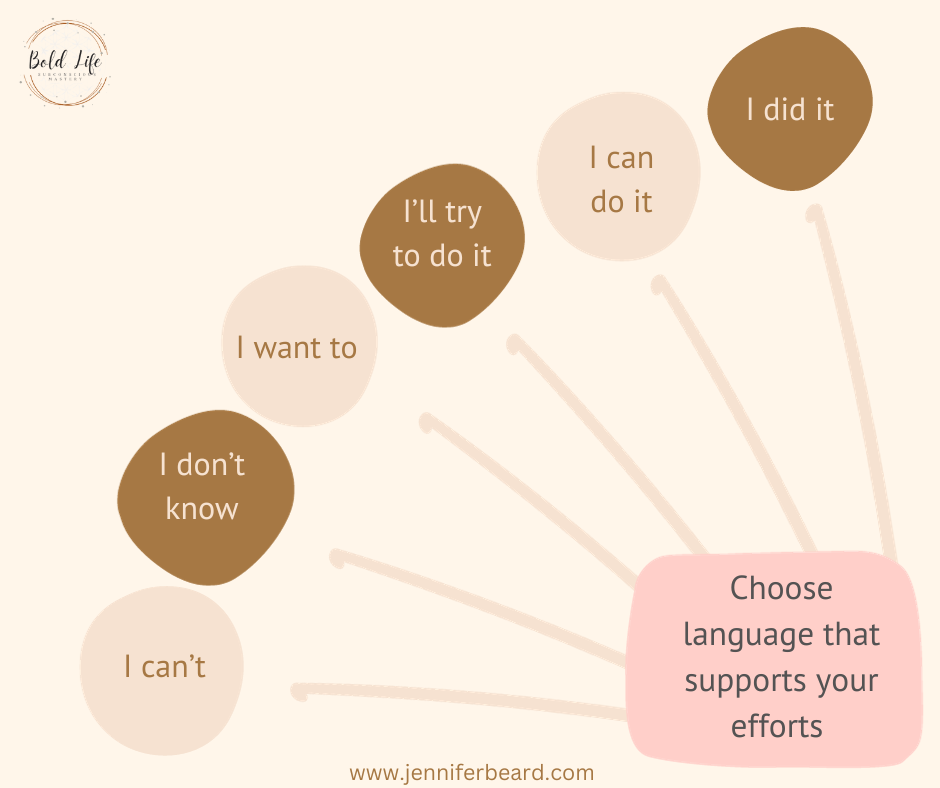Get the Guide
A simple, encouraging guide to help parents confidently transition into homeschooling, build a customized learning rhythm, and create a thriving educational experience at home.
Homeschooling 101 Starter Guide
Family
FAVE LINKS
Topics
Hi, I’m Jennifer — transformation coach, homeschooling mentor, and guide for parents ready to create a life that truly fits. I help you break through fear, align with your values, and confidently design both your child’s education and your own bold, authentic life.

Two years ago, my son and his friend Alex joined a karate class. Both were eyeing a spot on the studio’s prestigious wall of fame, reserved for exceptional students. My son, a natural competitor who thrives on challenges, practiced daily with a positive mindset.
He’d often say, “I’m getting better everyday mommy,” his words brimming with optimism. Alex, though a bit older and just as talented, was more self-critical, frequently saying, “I’ll never get this right.”
As time passed, their contrasting attitudes had a clear impact. My son’s skills and confidence rapidly improved, his positive outlook fueling his growth and resilience.
Alex, on the other hand, found progress difficult, his negative self-talk acting as a barrier.
This experience with my son and Alex illustrates how our language profoundly influences our achievements.
My son’s optimistic words propelled him forward, landing him on the wall for a high jump competition. It wasn’t for his Karate skills, but he turned his aspirations into reality, none the less.
Alex’s pessimistic view hindered his potential. This demonstrates how much our words can shape our life’s outcomes.
The limits of my language mean the limits of my world.
– Ludwig Wittgenstein
Alex isn’t unique in his attitude toward life. Many people see the world from a glass half empty perspective.
The way we use words in our everyday language has a profound effect on what we have the ability to create.
If we say “I’m lazy” or “I’m a procrastinator” how can we expect to come up with the energy necessary to create change in our lives?
These messages do affect the subconscious mind and will keep us from achieving our goals.
Language is one of the main contributors to the formation of our emotions. This makes it incredibly important to our emotional wellbeing overall.
By using language either negatively or positively we determine our perspective.
The Reticular Activating System (RAS) in the brain is like a filter. It helps you focus on important information and ignores the unimportant.
It sorts through everything you see, hear, and feel, deciding what’s important and what isn’t.
Imagine it as a personal assistant for your brain, spotlighting things you should pay attention to and ignoring the rest.
Here’s how it works with language: if you frequently talk and think about positive goals, your RAS tends to highlight related information and opportunities.
On the flip side, if you often use negative or pessimistic words, your RAS becomes more sensitive to negative things happening around you.
Essentially, the language you use programs your RAS to focus on certain things in your environment that match your thoughts and words.
The Science
Studies have shown that positive language affects multiple areas of life including:
Happy Couples Speak Kindly: Gottman and Silver’s 1999 research uncovered a key ingredient for relationship happiness. By studying couple interactions, they found that partners using more positive language tended to have stronger, more fulfilling relationships and a lower risk of separation.
Wellness Through Words: In 2000, Cohen and colleagues demonstrated how language impacts our health. Participants wrote about life events, either positive or negative, for 20 minutes over four days. Those focusing on positive experiences showed enhanced immune function, highlighting the health benefits of positive expression.
Positive Language Boosts Brainpower: Galinsky and team’s 2001 study revealed a fascinating link between language and cognitive performance. Participants solving word puzzles after hearing positive phrases outperformed those exposed to negative language.
This suggests that positive words can sharpen our mental abilities.
Changing Language, Changing Results
We have the ability to change our life by choosing to use words that are more optimistic, more positive. Here are a few ways we can change our lives using language:
1. Self-Talk and Personal Development
The words we say to ourselves determine the actions we take. Ghandi said it best:
Keep your beliefs positive because…
Your beliefs become your thoughts
Your thoughts become your words
Your words become your actions
Your actions become your habits
Your habits become your values
Your values become your destiny
You thoughts are a part of the chain that determines your destiny. And I do believe we need to go one step further to change beliefs.
One way to change beliefs is to use your thoughts and words. We often refer to these as affirmations (I discussed how to use these most effectively in last week’s newsletter – here).
So you see, the chain also has an effect going the opposite direction.
2. Communication Skills for Better Relationships
The use of language significantly impacts relationships. This highlights the importance of being mindful about how we communicate and how language is used in interactions.
Because we know that words, not only, express emotions, but determine them. We can understand more about how people are feeling when they communicate with us.
We can use this knowledge to demonstrate active listening.
Active listening is the practice of fully concentrating on what is being said, rather than just passively hearing the speaker.
It involves paying close attention to the speaker’s words, showing interest, and providing feedback to show that you understand.
It’s not just about hearing the words, but also about understanding the message and emotions behind them.
We may realize that behind these words is fear, guilt, or shame. Furthermore, these feelings may stem from beliefs formed as children (this was discussed in last weeks newletter – here).
Knowing that helps us to have empathy.
People are not always aware that their beliefs are affecting the meaning they give to current events.
Remembering that we were all at one time children, forming beliefs about life and our relationships helps us to see our loved one in a kind and loving light.
3. Language in Goal Setting and Achievement
There are studies to show that positive self talk is shown to increase resilience, motivation, and our ability to reach difficult goals.
One such study was conducted by Bandura in 1997. The research discovered that those who practiced positive self-talk tended to persevere more in difficult tasks. In turn, leading to more successful outcomes and achieving their objectives.
It doesn’t matter whether we are speaking to ourselves or others the affects of language are profound.

Here are a few ways to overcome negative language patterns:
- Awareness and Pause: Start by becoming aware of your internal dialogue. Notice when you use negative self-talk. Pause and reflect on these moments. This awareness is the first step towards change.
- Reframe Negative Thoughts: When you catch yourself thinking negatively, try to reframe the thought in a positive or neutral way. For example, instead of thinking, “I can’t do this,” reframe it to, “This is challenging, but I can make an effort.”
- Positive Affirmations: Create a list of positive affirmations that resonate with you. Repeat these affirmations daily, especially during moments of self-doubt or negativity. Phrases like “I am capable” or “I am learning and growing” can be powerful.
- Gratitude Practice: Incorporate a daily gratitude practice. Each day, write down three things you are grateful for. This helps shift your focus from negative to positive aspects of your life.
- Surround Yourself with Positivity: Engage with positive content and surround yourself with people who have a positive outlook. Their language and attitude can influence and inspire you.
- Mindfulness and Meditation: Practice mindfulness or meditation to stay present and reduce negative thinking. This can help you gain control over your thoughts and emotions.
- Change Underlying Beliefs: Use a modality such as PSYCH-K®️ to change beliefs that lead to negative language. And alter the perspectives that lead to the glass half empty perspective.
We all know language has a profound impact on health, relationships and perfomance. Knowing this, I urge you to take pause and evaluate your language choices.
Are they supporting you in having the life you most desire? The relationships? The health?
If not, consider making a change today.
Take care,
Jennifer
p.s. I teach you how to transform your language habits below with a free guide to download.
This guide will take you to the next level
Transform Your Language Habits:
- Strategies for mindful communication: Speak with intention and clarity.
- Tips for positive language: Transform your words into a source of positivity.
- Techniques for effective dialogue: Enhance both personal and professional interactions.
Embrace the change and see the difference in how you connect with the world around you. Download now and start your journey towards impactful communication!
Disclaimer: Please note that this article is intended to provide general information and inspiration. While it offers valuable insights, it’s essential to remember that it’s not a substitute for professional advice or therapy.
Productivity
Homeschooling
authenticity
intuition
BeLIEF CHANGE
Browse the categories
JenniferBeard.com 2025. All Rights Reserved.
17195 Silver Lake Parkway #136 Fenton, MI 48430 | PRIVACY | TERMS
Hi, I’m Jennifer — transformation coach, homeschooling mentor, and guide for those who are ready to create a life that truly fits. I help you break through fear, align with your values, and confidently design both your child’s education and your own bold, authentic life.
HAPPINESS STARTS
WITH YOU!
Get this practical guide for living a life of joy now!
Start homeschooling confidently
Get the homeschool guide
Check out our private coaching



Comments Off on Stuck in a Rut? Check Your Language